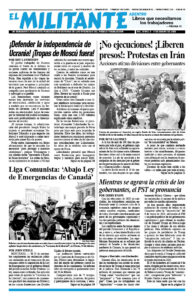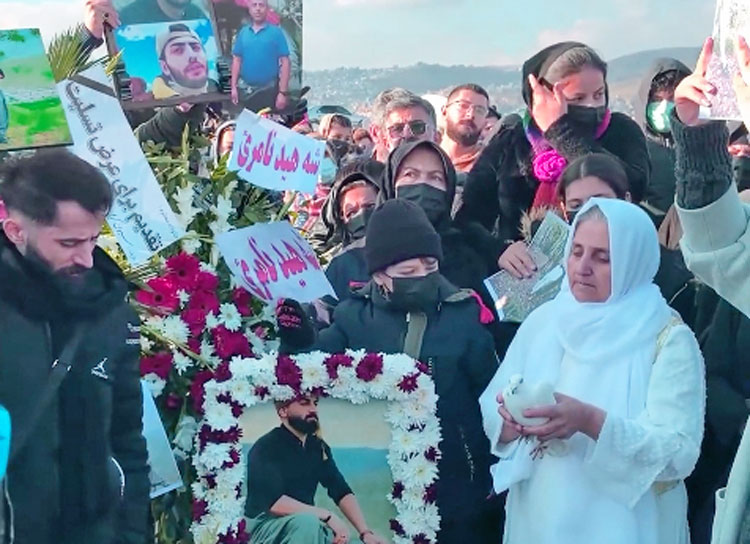In the face of more than 100 days of protests across the country by working people and youth, the capitalist government of Iran is suffering from deepening factional divisions over how best to proceed. The outpouring of opposition to the government’s trampling on rights was sparked by the death of Mahsa — Gina in the Kurdish language — Amini.
The young Kurdish woman died Sept. 16, three days after she collapsed following her arrest by the hated “morality” police in Tehran.
Even as the bourgeois clerical regime continues to send thugs to attack protests; arrests demonstrators, union leaders and others; and tortures prisoners, it vacillates, afraid to provoke more widespread protests against its repressive actions.
Before and after the execution of two protesters found guilty of “enmity to God,” tens of thousands took to the streets — and thousands more around the world — calling for an end to the death penalty and freedom for the nearly 20,000 political prisoners.
As of Dec. 28 no new executions have been carried out, while more than a dozen protesters still face charges that carry the death penalty.
In one sign of the rifts in the hard-line regime, the Iranian parliament press office Dec. 20 angrily denounced Shahab Hosseini, a well-known actor and movie director, for criticizing a statement by members of parliament calling for teaching protesters “a good lesson.” Hosseini said their statement unjustly called for imposing death sentences. The press office then claimed that the parliament majority never called for the death penalty, only for “retribution.”
Fight over death penalty
On Dec. 24, the court also ordered the retrial of Saman Seydi Yasin, a Kurdish rapper accused of setting a rubbish bin on fire and sentenced to death.
“Where in the world have you seen a loved one’s life taken for a trash bin,” his mother said in a video.
But the court upheld the death sentence against Mohammad Qabadlo, charged with striking and killing a police officer with a car. He was not allowed to have his lawyer present at the hearings. In a statement from prison, Qabadlo said the verdict was “devoid of honor and justice.”
According to the news site Bartarinha, radiologist Hamid Ghare-Hassanlou and his wife Farzaneh were driving back from the Nov. 3 funeral of a friend killed at a protest when they came across another anti-government demonstration. They got out of their car to see what was going on, and Farzaneh Hassanlou intervened when some ultra-left protesters attacked a Muslim cleric and was able to halt the assault.
That night members of the Islamic Revolutionary Guard Corps raided the couple’s home and beat them in front of their child. On Dec. 5 Hamid was sentenced to death and Farzaneh to 15 years in prison.
There’s conflicting press reports about whether the sentence against Hamid Ghare-Hassanlou has been suspended.
Taraneh Alidoosti, one of Iran’s most famous actors, was arrested Dec. 17 after she denounced the regime’s use of the death penalty. A number of actors and film directors protested publicly Dec. 20 outside the infamous Evin prison to demand her release.
The protests sparked by Amini’s death brought into the open pent-up anger toward both major wings of the regime, the lack of political freedoms, discrimination against oppressed nationalities and religious minorities, the oppression of women, attacks on unions and the impact of the economic crisis. Like the protests that swept Iran in 2017-18 and 2018-19, today’s actions also reflect opposition to the regime’s military adventures throughout the Middle East as it seeks to bolster its rule at home by advancing counterrevolution in the region.
Its expansionist drive includes the declared aim of eliminating the state of Israel, home to half the world’s Jews. Iran’s state broadcaster aired a video Dec. 17 threatening “Tel Aviv will be razed to the ground” if Israeli Defense Forces attack Tehran’s nuclear facility in Natanz.
Oil workers: ‘We are not slaves’
Every week there are new strikes by workers.
At more than a half dozen oil facilities workers have held short strikes over several weeks, calling for higher wages, restoration of overtime pay, better conditions and back pay owed to them. Based on the success of those actions, the Council for Organizing Oil Contract Workers together with permanent employees called for a strike and rallies at oil centers Dec. 24 under the theme “We are not slaves.” They are demanding wage increases and that more contract workers be given permanent positions.
But when workers got to the rally location in the city of Asaluyeh there were uniformed and plainclothes cops everywhere. Thirty workers were arrested. Fifteen were released that afternoon. Bosses prevented 10 workers from returning to work later.
Workers at the Abadan Oil Refining company, 400 miles north of Asaluyeh, went on strike that weekend to protest the threats to fire and prosecute workers who joined the Dec. 24 actions. The Oil Contract Workers union reports that the strike shut down the complex.
Oppressed nationalities
Nothing the Iranian regime has done has been able to stop the protest movement. On Dec. 27 alone there were actions in Hormozgan province in the south; in the mostly Azerbaijani city of Tabriz; in the Kurdish cities of Mahabad and Bukan; in Tehran; in Sistan-Baluchistan in the south; and in predominantly Persian Mashhad in the northeast.
Some of the largest actions continue to take place in cities and towns, large and small, in areas populated by Kurds and Baluchis, two of the oppressed nationalities in Iran with long histories of fighting for rights.
On Dec. 26 hundreds gathered at the Aichi cemetery in Saqqez City in Kurdistan for the 40-day ceremony to celebrate the life of 17-year-old worker Danial Paybandi, who was shot and killed by government forces there. According to the Coordinating Council of Iranian Teachers Union, the crowd chanted, “Azerbaijanis, Baluch, Kurds, Equality, Freedom.”
Women in Baluchistan, one of the most rural and underdeveloped regions in Iran, have faced widespread discrimination. Reflecting the impact of protesters’ demands for “Women, life, freedom,” Sunni cleric Shaikh Abdul-Hamid at a Dec. 23 prayer service attended by thousands in Zahedan, the capital of Sistan-Baluchistan province, rebuked the Taliban in neighboring Afghanistan for banning women from universities. Abdul-Hamid has also called on the Iranian government to end the death penalty and to stop the beating and torture of prisoners.
The fight of working people in Iran is winning support from workers in the region. On Dec. 22, members of the Transport Workers Union of Turkey demonstrated in front of the Iranian Consulate in Istanbul to call for freedom for Reza Shahabi, a leader of the Tehran Bus Workers Union who has been in prison since May 12, and for the release of all the union and political prisoners in Iran.


